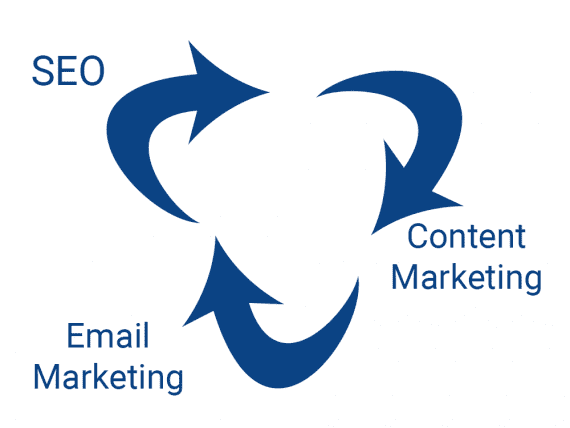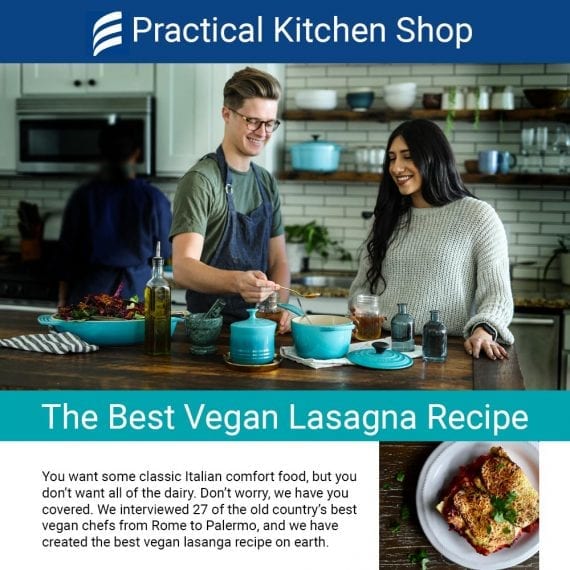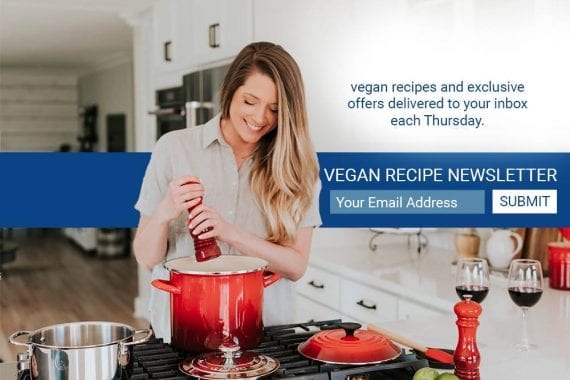Search engine optimization, content marketing, and email marketing can work together to create a virtuous cycle attracting customers to your ecommerce store, encouraging them to engage with your brand, and bringing them back for purchase after purchase.
Each of these marketing disciplines complements the others.
SEO aims to attract more and better quality website traffic from Google, Bing, Duck Duck Go, and similar. The discipline seeks to ensure search engine spiders can easily access and understand your site’s content. But it doesn’t stop there. SEO tries to understand what your potential customers are searching for to provide answers to their queries.
Content marketing is the act of creating or curating content, publishing it, and distributing it to attract, engage, and retain customers. It depends on reciprocity — offering something of real value (compelling content) and, in exchange, customers may feel a sense of obligation to the business, to buy products. Content marketing is also excellent fuel for SEO since it can answer queries from potential customers.
Email marketing can engage customers and prospects in a personal and relevant way. It can help your business stay connected, delivering timely, useful, and engaging material. It makes your customers aware of your latest products, offers, and content. It informs your customers and prospects about your brand, keeping them engaged between visits and purchases.

SEO, content marketing, and email marketing are complementary to promote your ecommerce business.
Working Together
To illustrate the combined benefits of SEO, content marketing, and email marketing, consider a hypothetical online store. I’ll start with SEO.
Keyword research. Imagine that you market for the online store, which sells cookbooks, kitchen appliances, and utensils. You want your company’s pages to rank well for important, traffic-driving keywords.
You monitor keywords, choosing which ones to target, analyzing the traffic volumes for each one, and monitoring each phrase’s average conversion rate. These SEO efforts are admittedly only part of what you do — there is also technical SEO, on-page optimization, and similar — but these in particular help identify content opportunities.
Your SEO research for the hypothetical cooking store might lead you to discover that the keyword phrase “vegan recipe” has seen a three-fold increase over the past five years, according to Google Trends.

Searches for the keyword phrase “vegan recipe” have tripled in the past five years. Source: Google Trends.
What’s more, a few specific keyword phrases, such as “vegan lasagna recipe,” “vegan soft pretzel,” and “cauliflower steak recipe vegan,” have seen breakout growth in recent months. These SEO insights might spark you to plan and schedule a new vegan-related content marketing series.
Content ideas. Your “Best Vegan Recipes” campaign could feature a weekly recipe video on Monday at Instagram television and on Tuesday at your store’s YouTube channel. On Wednesday, you publish a new post on your store’s blog, which includes a transcription of the video, several Pinterest-worthy photos, and the embedded YouTube video.

Your SEO keyword research can generate helpful content marketing ideas, such as this hypothetical example for “The Best Vegan Lasagna Recipe.”
The content not only helps your SEO efforts. It also provides quality info for visitors coming from Google or another search engine.
Good content grows your list. Being a savvy marketer, you have included an email subscription form on each vegan recipe post. The subscription form offers new visitors to your site — the folks who found your post on Google, for example — the opportunity to sign up for your editorial and promotional emails. Later, when those subscribers share your content, you could earn backlinks, which helps with SEO.

Adding subscribers to your email list can produce backlinks when those subscribers share your content.
The vegan recipes you post encourage email subscriptions. Before you know it, your store’s email list is growing rapidly.
Email encourages sharing. Each Thursday, you send a new email newsletter to your vegan recipe audience. The newsletter includes a link to the most recent vegan recipe, links to other articles on your site that could be of interest (avoiding dairy, eggs, and meat), a link to a curated recipe, and a featured product, such as chef Del Sroufe’s best-selling cookbook, “Forks Over Knives: The Cookbook,” or an attractive Le Creuset saucepan.
Your audience of email subscribers clicks to your posts and shares the recipes on Facebook, Pinterest, and, most importantly, on their own blogs and websites. The combination of your store’s social media connections and the backlinks from blogs and websites (perhaps an AllTop list?) helps to increase your store’s domain rating and improve its backlink profile. That nudge, however small, contributes to your company’s organic rankings, bringing us full circle to SEO.







